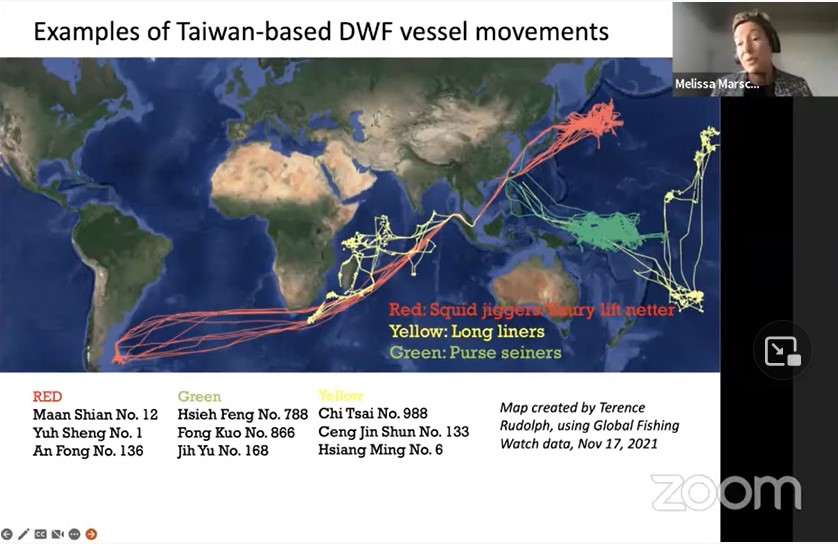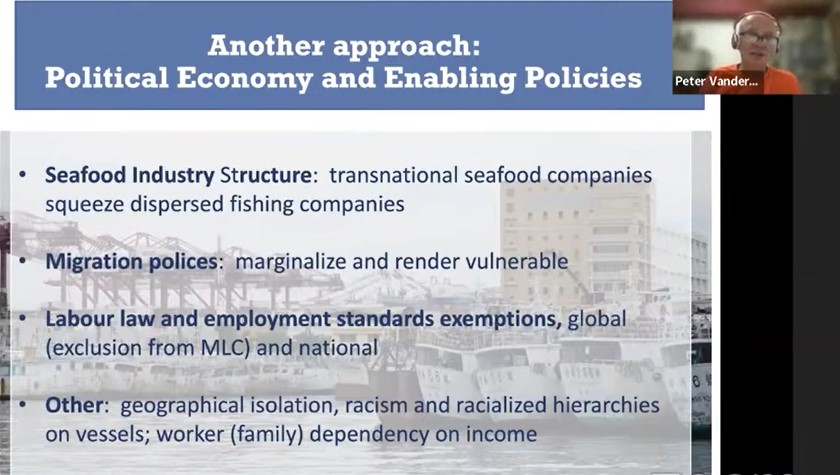 The September 2022 webinar of the V2V research platform to which Mundus maris is a partner featured Melissa Marschke and Peter Vandergeest who have worked together for the last decade or so on 'Unacceptable working conditions in global fisheries: Lawlessness, Criminality or Enabling Policies and Political Economies?'. They shared the results of their research and that of campaigns by advocacy groups digging up facts about at times horrendous living and working conditions particularly on vessels ploughing the high seas outside the purview of legal regimes. The first scandal broke about labour abuse of mostly Burmise and Cambodian migrant workers in the Thai fisheries in the mid 2010s.
The September 2022 webinar of the V2V research platform to which Mundus maris is a partner featured Melissa Marschke and Peter Vandergeest who have worked together for the last decade or so on 'Unacceptable working conditions in global fisheries: Lawlessness, Criminality or Enabling Policies and Political Economies?'. They shared the results of their research and that of campaigns by advocacy groups digging up facts about at times horrendous living and working conditions particularly on vessels ploughing the high seas outside the purview of legal regimes. The first scandal broke about labour abuse of mostly Burmise and Cambodian migrant workers in the Thai fisheries in the mid 2010s.
Thailand started some reform of the system. But why would people continue migrating into the fisheries? Labour abuse on board is not unique for one country and has been observed in other countries as well. The big Asian long-distance fleets from China, Taiwan, Japan and Korea have particularly strongly developed these last years and use mostly migrant crew, not only from other Asian countries, but also e.g. from West Africa. Slave labour or other labour abuses have also been documented in New Zealand and in some European countries.

The research identified a number of common features which characterise conditions on the world's high seas fleets, which are exemplified by six most common types of labour abuse that need addressing:
- It is the world's deadliest profession by staying on board often for more one year as vessels transship their catches and get aprovisioned at sea by reefers without touching a port;
- When catchable fish or invertebrates are found, long working hours are very exhausting while many vessels give little room for crew to sleep, eat and pause;
- Work is often characterised by considerable violence, including through language incompatibility as often the captain and first officer are from the flag country of country of the beneficiary owner, while the crew is recruited from migrant workers n different countries speaking other languages;
- The long isolation on board produces stress and exhaustion;
- Salaries tend to be very low - a bit higher in the Spanish fleet compared to Chinese or Taiwanese verssels - but many vulnerable migrant workers accept that entry to the industry while targeting to get better pay in the cargo fleet in a second move, if they can get there;
- Living conditions on board tend to be poor, crampted conditions, often even in combination with insufficient water supplies for drinking and washing.

Reforms are happening in many countries, but it's far from satisfactory at this point in time. Peter Vandergeest's research suggests that it is useful to look beyond the black sheep and responses through the exlusive lense of policing and criminal law. Peter suggests to understand that these conditions are a result of capitalist, industrial fishing and weak or not enforced labour and other applicable laws. The research tried to understand why such practices can happen and at what scale they do happen. First of all, the primary law applying to the flag state of the vessel. But in port, the port state has certain rights e.g. for inspection, but that involves crossing an international border as the flag state legislation still applies. Peter explained some of the complicated legal conditions which may help of hinder access to help crews or crews to seek help. He identified indeed the central role of the labour recruitment agencies for many of the woes of workers and the political economy of few dominating firms and that the legal distinction between seafarers with protective legislation and workers on fishing vessels not being considered as seafarers has made conditions worse for fishers. He also elaborated what could be enabling conditions and which measures and organisations were most effective to actually improving actual labour conditions.
Unfortunately, harmful fisheries subsidies were not mentioned, even though they perpetuate overfishing by oversized high seas fleets and are major contributing factors to labour abuse in their cost-cutting measures as they compete in the global market. See the full lecture and Q&A session here.








